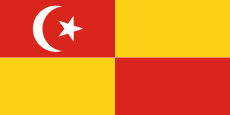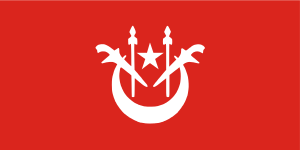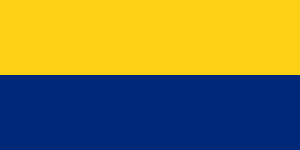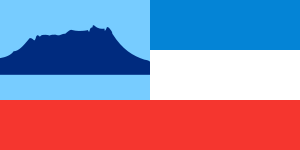Hussein Onn
Hussein bin Onn (12 February 1922 – 29 May 1990) was a Malaysian politician who served as the 3rd Prime Minister of Malaysia from the death of his predecessor Abdul Razak Hussein in January 1976 to his retirement in July 1981. Moreover, he was the Member of Parliament (MP) for Sri Gading from 1974 to 1981, representing Barisan Nasional (BN) and United Malays National Organisation (UMNO). He was granted the soubriquet "Bapa Perpaduan" (Father of Unity).
Yang Amat Berbahagia Tun Hussein Onn | |
|---|---|
حسين عون | |
.jpg) | |
| 3rd Prime Minister of Malaysia | |
| In office 15 January 1976 – 16 July 1981 | |
| Monarch | Yahya Petra Ahmad Shah |
| Deputy | Mahathir Mohamad |
| Preceded by | Abdul Razak |
| Succeeded by | Mahathir Mohamad |
| 3rd Deputy Prime Minister of Malaysia | |
| In office 13 August 1973 – 15 January 1976 | |
| Monarch | Abdul Halim Yahya Petra |
| Prime Minister | Abdul Razak |
| Preceded by | Ismail Abdul Rahman |
| Succeeded by | Mahathir Mohamad |
| 1st President of International Islamic University of Malaysia | |
| In office 1983–1987 | |
| Chancellor | Ahmad Shah |
| Preceded by | Position established |
| Succeeded by | Anwar Ibrahim |
| Personal details | |
| Born | Hussein bin Onn 12 February 1922 Johor Bahru, British Malaya (now Malaysia) |
| Died | 29 May 1990 (aged 68) South San Francisco, California, United States |
| Resting place | Makam Pahlawan, Masjid Negara, Kuala Lumpur, Malaysia |
| Citizenship | Malaysian |
| Political party | Independent (1987–1990) |
| Other political affiliations | United Malays National Organisation (Before 1951; 1968–1988) Independence of Malaya Party (1951–1963) National Party (1963–1968) |
| Spouse(s) | Suhailah Noah[1] |
| Children | 6 (including Hishammuddin Hussein) |
| Education | Indian Military Academy Lincoln's Inn English College Johore Bahru |
| Profession | Lawyer |
| Military service | |
| Allegiance | |
| Branch/service | British Indian Army |
| Years of service | 1940–1945 |
| Rank | Captain |
Family
He was born in Johor Bahru, the son of Datin Halimah Hussein and Dato' Onn Jaafar, a fighter for Malaysian independence and co-founder of the United Malays National Organisation (UMNO).[1] His grandfather Dato Jaafar Haji Muhammad was the first Menteri Besar (chief minister) of Johor while his grandmother, Roquaiya Hanim (also spelled Rogayah Hanim or Rukiye Hanım) came from the Caucasus region of Ottoman Empire. She was likely presented as a concubine (see Circassian beauties) by the Ottoman court to the sultan of Johor.[2] Hussein was the brother-in-law of Tun Abdul Razak, his predecessor as Prime Minister, who also married another Tan Sri Haji Mohamed Noah Omar's daughter, Tun Rahah Noah.
Tun Hussein married Tun Suhailah Noah in 1948.[3] Suhaila Noah was the daughter of Tan Sri Haji Mohamad Noah Omar, former Minister of Home Affairs and first Speaker of the Dewan Rakyat.[3] Hussein Onn and Suhaila Noah had six children, including their fourth child, Hishammuddin Hussein, the Minister of Defence from 2013 to 2018.[3] Their eldest daughter, Datin Roquaiya Hanim, died on 17 September 2005, at the age of 56 from breast cancer in Kuala Lumpur.[3]
Early life
Tun Hussein received his early education in Telok Kurau Primary School, Singapore and at the English College Johore Bahru. After leaving school, he joined the Johor Military Forces as a cadet in 1940 and was sent a year later to the Indian Military Academy in Dehradun, India. Upon completion of his training, he was absorbed into the Indian Army served in the Middle East when the Second World War broke.[1] After the war, his vast experience prompted the British to employ him as an instructor at the Malayan Police Recruiting and Training Centre in Rawalpindi.[1]
Tun Hussein came back to Malaysia in 1945 and was appointed Commandant of the Johor Bahru Police Depot. The following year he joined the Malaya Civil Service as an assistant administrative officer in Segamat, Johor. He was later posted to the state of Selangor, becoming Klang and Kuala Selangor's district officer.
Entering politics
Tun Hussein, who came from a family with deep nationalistic spirit and political roots,[1] resigned from the civil service to go into politics. In 1949, he became the first youth chief of UMNO (United Malays National Organisation), a party his father helped establish. In 1950, he was elected the UMNO secretary general. Tun Hussein however left UMNO in 1951 to join his father in forming the Independence of Malaya Party (IMP).[1]
With IMP losing momentum, Tun Hussein went to London to study law and was called to the Bar and admitted as a member of the Honourable Society of Lincoln's Inn, qualifying as a Barrister-at-Law. He came back as a certified lawyer and practised in Kuala Lumpur.[1]
Rise to power
Hussein Onn returned to politics in 1968 after being persuaded by the then Deputy Prime Minister Tun Abdul Razak to rejoin UMNO.[1] He stood and won the general elections in 1969 and was appointed as the education minister. Tun Hussein's meteoric rise continued on 13 August 1973 when he succeeded the late Ismail Abdul Rahman as the Deputy Prime Minister.[1] On 15 January 1976 he was appointed as Prime Minister of Malaysia after the death of Tun Razak.[4]
Hussein was renowned for stressing the issue of unity through policies aimed at rectifying economic imbalances between the various communities found in Malaysia.[1] For instance, 20 April 1981 saw the National Unit Trust Scheme being launched. He also gave serious consideration to the concept of Rukun Tetangga (a neighbourhood watch scheme) and the fight against the drug menace.
He underwent a coronary bypass in early 1981. On 17 July the same year, he retired from active politics and relinquished his prime minister post due to health concerns.[1] He was succeeded by Mahathir Mohamad, his deputy.
Post-retirement
After his retirement as Prime Minister, he continued to contribute to welfare organisations. He was instrumental in the setting up of the Tun Hussein Onn Eye Hospital. He was also an advisor to Petronas, the country's oil company, and Chairman of Institute of Strategic and International Studies (ISIS).
During the 1987 UMNO leadership crisis, Hussein fell out with Prime Minister Mahathir Mohamad, supporting Team B along with Tunku Abdul Rahman. Hussein along with the Tunku, henceforth, became a strident critic of the Mahathir administration and died without having rejoined UMNO.
Hussein Onn died on 29 May 1990 in Seton Medical Center at San Francisco, California, at the age of 68.[1] He had two sons and four daughters. He is buried in Makam Pahlawan (Heroes Mausoleum) near Masjid Negara, Kuala Lumpur.
Awards and recognitions
Honours of Malaysia

_-_SMN.svg.png)



_-_ribbon_bar.png)








.svg.png)









_-_1._Knight_Grand_Commander_(DP).svg.png)
.svg.png)

Places named after him
Several places were named after him, including:
- Bandar Tun Hussein Onn, a township in Cheras, Hulu Langat, Selangor
- Desa Tun Hussein Onn, a Malaysian Armed Forces residential area near Setiawangsa, Kuala Lumpur
- Tun Hussein Onn Jamek Mosque, a mosque in Larkin, Johor, Johor
- Tun Hussein Onn University of Malaysia (UTHM) Batu Pahat, Johor
- Institut Pendidikan Tun Hussein Onn (IPTHO) Batu Pahat, Johor
- Kolej Tun Hussein Onn, a residential college at Universiti Kebangsaan Malaysia, Bangi, Selangor
- Kolej Tun Hussein Onn, a residential college at Universiti Teknologi Malaysia, Skudai, Johor
- Kolej Tun Hussein Onn, a residential college at Universiti Malaysia Perlis, Kuala Perlis, Perlis
- SMK Tun Hussein Onn (SMKTHO), a secondary school in Kluang, Johor
- SMK Tun Hussein Onn (SMKTHO), a secondary school in Seberang Jaya, Penang
- SK Tun Hussein Onn (SKTHO), a primary school in Kampung Pandan, Kuala Lumpur
- Tun Hussein Onn National Eye Hospital, Petaling Jaya, Selangor
- Tun Hussein Onn Highway, part of the Penang Bridge, Penang
- Jalan Tun Hussein Onn, a major road in Putrajaya
- Tun Hussein Onn Hockey Cup
- Dewan Tun Hussein Onn, Putra World Trade Centre
- Tun Hussein Onn Memorial, a memorial in Kuala Lumpur
Notes and references
- "Tun Hussein Onn". Retrieved 1 June 2012.
- Mehmet Ozay; Ekrem Saltık (June 2015). "The Myth and Reality of Rukiye Hanim in the Context of Turkish Malay Relations (1864–1904)". Insan & Toplum – Journal of Humanity and Society. 5 (9): 55–74. doi:10.12658/human.society.5.9.M0116.
- "Tun Suhailah, widow of 3rd PM Tun Hussein Onn, dies at 82". The Malaysian Insider. 4 October 2014. Archived from the original on 23 October 2014. Retrieved 22 October 2014.
- Tan, Chee Khoon & Vasil, Raj (ed., 1984). Without Fear or Favour, p. 38. Eastern Universities Press. ISBN 967-908-051-X.
- "Senarai Penuh Penerima Darjah Kebesaran, Bintang dan Pingat Persekutuan Tahun 1981" (PDF).
- "DK 1977". awards.selangor.gov.my. Retrieved 6 March 2018.
| Wikimedia Commons has media related to Hussein Onn. |
| Political offices | ||
|---|---|---|
| Preceded by Ismail Abdul Rahman |
Deputy Prime Minister of Malaysia 1973–1976 |
Succeeded by Mahathir Mohamad |
| Preceded by Abdul Razak |
Prime Minister of Malaysia 1976–1981 | |
| Diplomatic posts | ||
| Preceded by Suharto |
Chairperson of ASEAN 1977 |
Succeeded by Corazon Aquino |
.jpg)